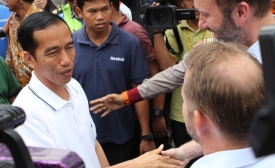Jokowi
President Joko "Jokowi" Widodo has urged the Cabinet to enhance the soft-power approach to improve Indonesia's image, highlighting national branding as a strategy to improve the country's competitiveness in trade, tourism and investment.
On 29 April Indonesia executed seven foreigners and one Indonesian for drug offences. The refusal of President Joko Widodo (Jokowi) to offer clemency despite pleas from foreign leaders has been analysed in a number of ways.(...)But was his decision instead a deliberate act of public diplomacy, designed to send signals to those missing the Sukarno era?
Six months after taking office, Indonesian President Joko Widodo is starting to step away from his predecessor’s foreign policy of keeping everyone happy. Widodo, known as Jokowi, criticized the United Nations and International Monetary Fund at this week’s Asian African Conference in Jakarta. He’s pledged to increase defense spending, ordered foreign boats seized for illegal fishing to be destroyed, and declined to pardon two Australian drug smugglers facing a firing squad, leading to warnings of damaged ties.
Next month, Indonesia will be hosting the commemoration of the 60th anniversary of the 1955 Asia-Africa Conference. According to Indonesian President Joko Widodo, the commemoration aspires to remind the world that Indonesia played a significant role in the anti-colonial struggle. Amidst complex contemporary global politics, it will be a challenge for Jokowi to convince the world that this Asia-Africa gathering is necessary and relevant.
Indonesia was gripped by election fever over recent months, with talk of the impending election of a new president on the population’s lips. Unsurprising, since this person will lead the world's third largest democracy and a rising power closely watched internationally.

The time is right for Indonesia's President to strengthen his country's image and policies.







